Centre for Community Engagement and Social Change Year End Report 2024-2025
Introduction to the goal
The CCESC committed to leveraging the strengths within our faculty to understand and explore a range of dilemmas and solutions by engaging heads, hearts, and hands to further social, environmental, and political justice. By bringing together researchers, students, and staff with community partners, policymakers, and practitioners, the CCESC efforts emerge at the nexus of praxis, engaging locally and globally in impactful research that is broadly disseminated and internationally recognized as contributing to societal research impact. This goal is therefore built upon a foundation of capacity building, providing funding opportunities, and engagement initiatives driven by or in partnership with CCESC.
Bringing the goal to life
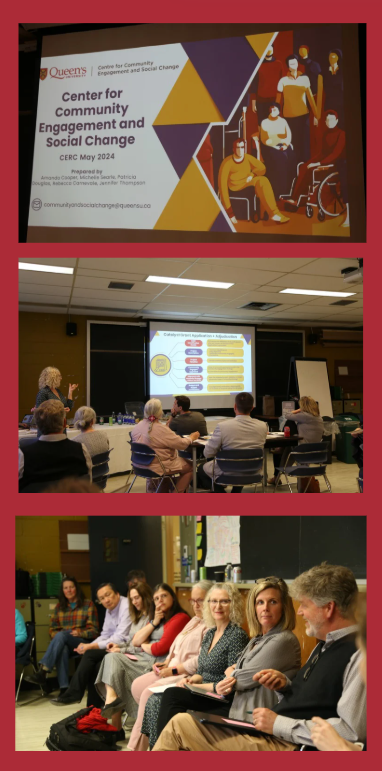
Community-Engaged Research Clusters (CERCs)
From 2023-2024, a rigorous application and adjudication cycle was held to establish six initial CERCs. These CERCS are led by faculty members of Queen’s University but also contain both academic and community partners. These inaugural CERCs were established with input from an initial advisory group comprised of Dr. Wendy Craig, Tracy-Ann Johnson-Myers, Kelly Nolan, Erin Clow, Dr. Amanda Cooper, Dr. Searle, Dr. Douglas and the everyday working team. These ERCs represent research strengths in the Faculty of Education; each CERC was provided with $15,000 of seed funding to seed community-engagement projects. These CERCS were founded through an open call to faculty and represent priority research areas in the Faculty of Education. CERCs are an integral part of the CCESC governance structure, including vital pathways to community-engaged research, partnerships, and advancement.
Other key milestones include the launch of CERC Catalyst Initiation Grants in January 2024, and a CERC working session May 13, 2024, facilitated by Drs. Patty Douglas and Michelle Searle to connect and introduce CERCs, provide a progress update, and answer questions. A key concern of CERCs was the length of time available to spend funding. In response to CERC requests, the funding timeline was elongated to enable all CERCs to have access to funds until April 1, 2026. Throughout 2024-2025, CERCs have been meeting in project teams and coming together for ongoing sessions to advance understanding about projects and identify connections.
The following pages broadly introduce the goal and focus of the six community-engaged research clusters.

Arts for Social Change
Leveraging arts learning to support sustainable development, health and well-being, and global citizenship.
- Supporting sustainable development, health and well-being, global citzenship.
- Collaborating will include local, regional, national, and international partners. Advancing SDGs 4, 3, 14 to promote change.
- Addressing regional history through art and explore issues from a historical perspective with artistic expressions as point of reference.
- Focusing on practical implementation of Partner-based initiatives (e.g., exchanging knowledge of digital technologies and strategies used by professional artists in music industries).
- Accessing and addressing opportunity barriers, inclusion and diversity within the arts
- Reflecting and critically considering practices and mobilization efforts
- Advancing equitable and inclusive recruitment, participation and decision-making
Collaborative Evaluation for Social Change
Expanding research and knowledge for equitable assessment and evaluation in education systems by developing integrated approaches for equity, diversity, and inclusion practices.
- Developing integrated approaches for I-EDIAA in our research area, a National Advisory Committee, Provincial Committees, and Pan-Canadian Stakeholder Working Groups.
- Creating I-EDIAA-infused/ community-driven curriculum and resources incorporating anti-oppressive, decolonizing, and Indigenous ways of knowing, and gender diversity in education.
- Establishing free online national training portal (Massive Online Open Course, MOOC) for capacity-building and certification of I-EDIAA practices for assessment and evaluation for early years, K-12, and higher education sectors.
- Providing specialized training for Graduate students across four areas–research, stakeholder engagement, KMb, and IEDIAA.
- Recognizing systemic discrimination for marginalized groups therefore equitable, safe, inclusive environments are critical
- Prioritizing diverse collaboration/ representations of research, knowledge, experiences, and learning
- Grounding research in practices promoting empowerment and student agency
Decolonizing and Indigenous Community-Based Research
Centering Indigenous theoretical perspectives primarily from the Anishinaabe Nation and Haudenosaunee Confederacy and decolonial education based on acceptance, inclusion, and radical decolonial love
- Centring on Indigenous theoretical perspectives from primarily the Anishinaabe Nation and the Haudenosaunee Confederacy.
- Embodying Seven Grandfather Teachings and the Great Law of Peace. Academic theories, Tribal Critical Race Theory, or TribalCrit, etuaptmumk, ‘two-eyed seeing’, and Radical Decolonial Love.
- Utilizing Indigenous Community-Based Participatory Action Research - community partners as equal collaborators. qualitative, narrative, arts-based, auto-ethnographic, quantitative, and mixed methods research.
- Focusing on Community-Connected Results - open and collaborative throughout the entire research project. Community reports, guidance from community on presentations and article publication.
- Centring on critical anti-racist and anti-oppressive lenses and Indigenous principles (e.g. Seven Grandfather Teachings)
- Recognizing the importance of intersectionality and value of multiple perspectives and identities
- Engaging in the four Rs: relevance, reciprocity, responsibility, and respect
Disability, Advocacy, and the Arts
Cultivating an affirming approach to disability - “Nothing without us” - our research advances inclusion and social justice in education by elevating the experiences and knowledge of diverse disabled students and disability communities. We tap the power of community-based research, disability arts and storytelling to foster positive social change in educational research and practice and increase arts and educational access.
- Affirming approach to disability in education in the Faculty of Education and at Queen’s University.
- Centering the experiences and perspectives of disabled students and disability communities - “Nothing about us without us”.
- Fostering positive social change through increasing arts access, shifting deficit mindsets and remaking educational worlds in affirming ways.
- Engaging in digital storytelling, social media/website outreach, accessibility toolkits, community reports and infographics, micro-credentialing.
- Building new networks, promoting research, student opportunities, capacity-building, belonging for all integrated into policy-development, community outreach for underserved communities.
- Focus on reciprocal collaborations with marginalized disability groups
- Critical, creative, participatory and action-oriented approaches/ methods
- Prioritizing communication and access to dismantle systemic barriers whenever possible
Early Years & Multiliteracies Research Group
Dedicated to engaging in collaborative approaches with community members, we use the term “multiliteracies” to consider the complexities of language and literacy learning in today’s global society. We are committed to translating and mobilizing our ongoing research in accessible ways to ensure anyone interested in learning more about the impact of early experiences, literacy and language development, and their impacts on lifelong learning have access to this information.
- Involving members in community-engaged research that incorporates literacies across early years, at the local level, and internationally.
- Building on past projects include: early literacy and reading development, professional learning, evaluations of literacy programs, and teacher self-efficacy and professional development.
- Linking to Deklerk (2020) who suggests that varying modes through which literacy can take place “expands our lens of what qualifies as literacy skills and developmental practices” (74).
- Translating and mobilizing our ongoing research in accessible ways to improve access for anyone interested regardless of position, education, or background.
- Recognizing children who fall behind in reading in the early primary grades, unfortunately, too often remain behind beyond the elementary level.
- Focusing on Inclusivity: Partners valued, respected, and celebrated for their diverse knowledges
- Recognizing education is a Human Right, challenged by war and conflict, focusing on trauma-informed and refugee-led approaches
- Making literacy more accessible to all learners through direct and systematic instruction + wide dissemination
Transformative Technologies for Social Good
Leveraging technology to address current issues related to the United Nations Sustainable Development Goals (SDGs) and considering ethical problems with technology and using technology to help solve the world's problems.
- Leveraging technology to learn more about and address current issues (SDGs).
- Examining the use of innovative technologies so they might live up to their potential and in turn provide new possibilities for solving the problems contained in the SDGs. Areas include: AR/VR, AI, Robotics, knowledge-building.
- Considering ethical problems with technology. Guided by CERC members with artifcial intelligence and SGD ethical expertise.
- Initiating two-way dialogue between researchers and communities.
- Exploring the potential role of technology in giving students tools and skills to address wicked problems.
- Using Indigenous ways of knowing/ land-based learning
- Ensuring equitable access to learning and food and other essential resources at forefront of work
- Focusing on sustainable inclusion and Participation of community (particularly marginalized youth)
Individual, Faculty, and Community Funding Opportunities
In addition to the CERC seed funding, over the 2024-2025 year, CCESC has rolled out a variety of other funding opportunities for Queen’s community members to initiate smaller projects and activities.
Amplify Grants
The purpose of this grant is to support faculty, instructors, and staff to amplify community-engaged research in the Faculty of Education through funding small, focused research and knowledge mobilization initiatives. The bulk of funding this year was focused on supporting graduate and undergraduate research assistantships.
This fiscal year, CCESC awarded 11 Amplify Grants, totaling $37,340 of committed funds to Community Engaged Researchers. Next year, granting will focus on working with faculty to develop externally funded grants.
|
Visiting Scholar and Guest Speaker Fund
Visiting Scholar and Guest Speaker Fund at Queen’s Faculty of Education supports visiting scholars and guest speakers with expertise and/or experience aligned with community engagement and social change. Funding for this opportunity is meant for small scale community-engaged speakers, visiting scholars and events, and is capped at $1000 per applicant/host in order to fund items such as travel expenses and honoraria for Guest Speakers. Applications are assessed on the basis of Guest Speaker/ Visiting Scholar information, proposed activities and KMb plan as well as connection to Community Engagement principles. This fiscal year, CCESC awarded four Speaker Fund grants, committing over $2800 to a variety of events.
| Initiative/ Event |
| Public Lecture: Dr. Yan Zi Education University of Hong Kong |
| The Rosa Bruno-Jofré Symposium in Education |
| 1 Million Teachers Film Screening “Kaka” |
| Meeting the Needs of Learners Public Panel |

A Example of Praxis in Action
Internships 2024-2025
The CCESC CERC, Collaborative Evaluation for Social Change Research Cluster with Jennifer Thompson and Jenny Lee from the Graduate Studies Office, collaborated with Katie Frizzel in the Experiential Learning Hub to craft a pilot cohort internship opportunity for graduate students. The internship program is an extension of ongoing teaching and research stemming from QEval, led by Dr. Michelle Searle, in collaboration with UEval, led by Dr. Rebecca Gokiert of the Evaluation Capacity Network. Their research has revealed that community partners value evaluation and collaboration but required sustained support to reach inquiry goals. The internship cohort model was envisioned as a way to meet community partner needs, serve student interests for learning through applied practice and conduct research into engaged scholarship.
More than 15 students expressed interest in the internship opportunity with 10 students completing the application process and eight students taking part in internships. Interns who were full-time students received a $1000 stipend for their participation. Stipends were funded through the CERC Catalyst Grant Dr. Searle and Cooper earned. Some funding and in-kind support was provided by community partners.
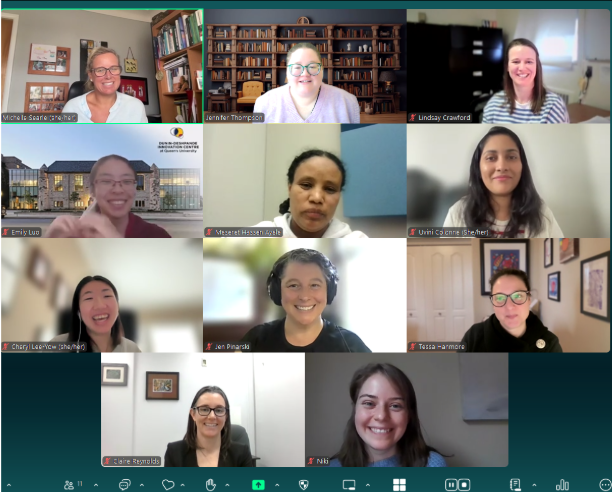
The internships ran from September 2024 through April 2025. Each internship involved students collaborating with a community partner on a specific project to deepen research and evaluation skills while contributing to community. Internship varied, some took place in-person, remote, or hybrid depending on the partner needs. Student interns dedicated approximately 70 hours towards working with their community partner and approximately 30 hours to a community of practice /CCESC activities. Simultaneously, interns met as a community of practice (CoP) monthly, working with Dr. Michelle Searle and Jennifer Thompson.
Community Partners in 2024-2025 Included:
- Ottawa Carlton District School Board, inquiry into implementation of an inclusive school design
- Huron Perth District School Board, inquiry into equity, diversity and Indigeneity plus supporting school attendance goals
- Modern Fuel Artist Fuel Centre, understanding a program for Indigenous youth and interdisciplinary arts
- Dunin-Deshpande Queen's Innovation Centre, exploring the Future Leader’s Initiative
- City of Kingston, enhancing processes and building capacity for evidence-informed decision-making
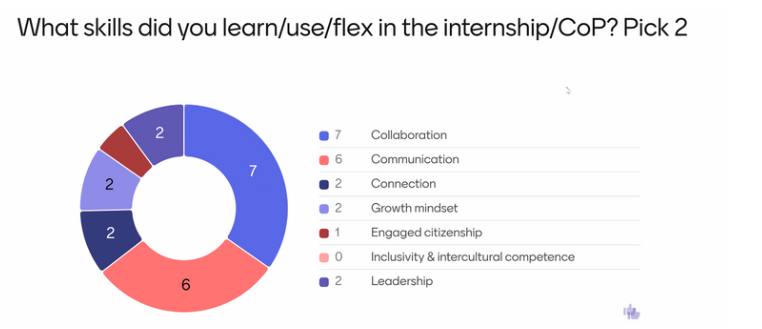
On April 11th 2025, the internship group hosted a final partnership celebration where community partners and students were invited to share their learning and their experiences, and reflect on the collaborative work that took place over this year.
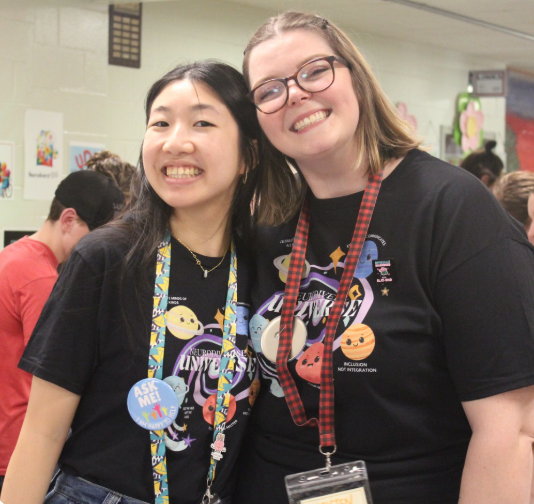
Disability Justice Group
This student research group was established in Winter 2024 by Centre Director Patty Douglas. Its purpose is to practice community-engaged research and knowledge mobilization and put into action the principles of disability justice, including “Nothing About Us Without Us”, intersectionality, and collective care, in the Faculty of Education, Queen’s University, and Kingston communities. The group supports research and action aimed at increasing radical access, reducing stigma around disability, valuing interdependence, and providing research-informed information for faculty, staff, students, and community members to help them develop more affirming pedagogies and research practices around disability in education.
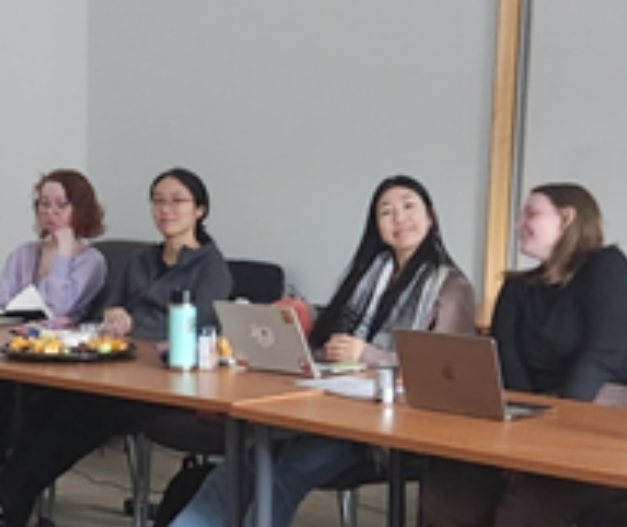
Since its inception Hayley Clark (PhD student) has been leading this group in a research associate position with support from Jennifer Thompson. The Disability Justice group is currently comprised of 10 members, who have gathered four times to develop the ethos and plan activities. Membership is open to anyone and is ongoing. This year, the Disability Justice group has been focused on creating a capacity-building session about supporting students with disabilities in university classes and assisted with the planning and hosting of the second annual Neurovibes event, including sponsorships on April 3, 2025.
Future directions for Goal 3
We are incredibly proud of the ongoing work of the CCESC-affiliated researchers and partners, and part of our goals moving forward is to expand our impact to the wider Queen’s and Kingston community.
- Compiling information from CERC reporting, which will provide enhanced data about the impact on research strengths and future directions to enhance and extend these areas.
- Initiating data collection with students who have participated in CCESC to gather experience statements and develop best practices for supporting student researchers in CE work.
- Ongoing funding for research projects, with a focus on development grants, and guest speakers (Next Adjudication Cycle in June 2025)
- Increase outreach to the wider Queen’s community, researchers at other universities and areas of expertise with CE work
- Shift funding focus on community-engaged projects and partnerships and work to develop a grant for community-initiated research project partnerships and development grants (development of Tri-Agency grants).